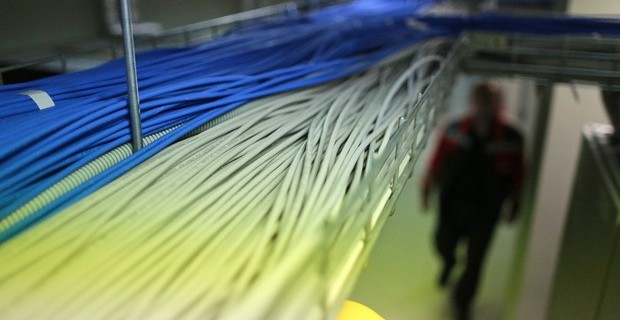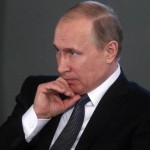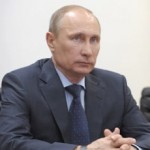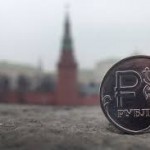Google warning on Putin’s possible Internet censorship might prove right

Google Inc. Chairman Eric Schmidt warned last year that Russia was “on the path” toward China’s model of Internet censorship. Vladimir Putin is proving him right.
With Russia locked in the worst standoff with the U.S. since the Cold War, the Russian president last week said his government needs to impose greater control over information flows through the World Wide Web, which the former KGB colonel called a creation of U.S. spy agencies.
Putin’s comments came after the lower house of parliament approved a draft law requiring Internet companies such as Google to locate servers handling Russian traffic inside the country, similar to Chinese rules, and store user data for six months. The legislation, which needs approval of the upper house and Putin’s signature to become law, also classifies bloggers with 3,000 or more readers — about 30,000 people — as “media” outlets, making them and their hosts liable for content and subject to regulation.
“This law is a step toward segmenting and nationalizing the Internet and putting it under the Kremlin’s control,” Matthew Schaaf, a program officer at Washington-based research group Freedom House, said by e-mail. “It could have a serious chilling effect on online expression in Russia, making users stop to think how their Google searches and Facebook posts could be used against them.”
Putin’s ‘Vendetta’
Russian intelligence agencies, just like their U.S. counterparts, constantly expand their cyber capabilities, Putin said at a meeting with media executives in St. Petersburg on April 24. Russia must protect its information in a market dominated by U.S. technology companies, said Putin, 61.
The bill on retaining user data follows a law enacted on Feb. 1 that gives Roskomnadzor, the communications regulator, the power to block without a court ruling websites deemed either “extremist” or a threat to public order.
Roskomnadzor did just that on March 13, when it temporarily shut off access to half a dozen sites, including opposition leader Alexei Navalny’s, to impede efforts to hold unsanctioned rallies against Putin’s annexation of Crimea. The regulator also closed 13 Ukrainian groups on VKontakte, a Russian site similar to Facebook.
“Putin sees a major threat to his rule from the U.S., with Ukraine being just the latest reason to attempt to discredit him,” said Alexei Mukhin, head of the Center for Political Information, a research group in Moscow. For Putin, “it has turned into a personal vendetta, so restricting the Internet is a necessary measure.”
‘Clean Conscience’
Russian agencies have been pressuring Internet companies for data on Ukrainians who supported the February ouster of that country’s Kremlin-backed president, Viktor Yanukovych, according to the founder of VKontakte, or VK, Pavel Durov.
Durov, who started VK in 2006, the same year billionaire Mark Zuckerberg opened Facebook Inc. to the public, said April 16 that he had sold his shares and stepped down as chief executive officer rather than comply with demands to turn over the personal data of Ukrainian users.
“I no longer have a stake, but I have something more important — a clean conscience and ideals that I’m willing to defend,” Durov said on his VK page.
For foreign companies, relocating servers to Russia may not be worth the investment, meaning their services may stop being available to Russians, said Karen Kazaryan, an analyst at the Russian Association for Electronic Communications.
Beating Facebook
Building a data center for companies as large as Google and Facebook could cost as much as $200 million, Kazaryan said. Maintaining six months of data on every user might cost another $10 million a year, according to Kazaryan.
Moscow representatives of both Google and Facebook declined to comment on the legislation. Their U.S. offices didn’t respond to requests for comment.
Russia is one of the few countries where domestic companies beat U.S. competitors in search, e-mail, social networks and games, according to Dmitry Grishin, CEO of billionaire Alisher Usmanov’s Mail.ru Group Ltd., which owns VK and another social network called Odnoklassniki, both of which are more popular than Facebook in Russia.
“The move toward excessive regulation of the Web,” Grishin said by e-mail, “will lead to Russia losing the Internet as a unique sector that could’ve become a growth area for a new, post-industrial economy.”
Incompatible Russia
The shares of Mail.ru and its biggest domestic competitor, Yandex NV, which handles 60 percent of all Russian-language searches, both fell more than 16 percent last week, the most ever. That pushed Yandex’s decline this year to 44 percent, making it the worst performer on the Bloomberg index of the most-traded Russian stocks in the U.S., after doubling in 2013.
The new legislation and other proposals by a Kremlin working group on online security jeopardize Russia’s Internet growth, the Kommersant newspaper reported yesterday.
The working group is proposing dividing data networks into three groups — nationwide, regional and local — which would make it easier for the government to monitor traffic, Kommersant said, citing unidentified people familiar with the matter.
Russia’s move toward greater control “sets a worrisome precedent and undermines the values that make the Internet great,” Peter Micek, a policy counsel for digital rights organization Access, said by e-mail. “We are seeing many governments that want to clamp down on what happens online. Our concern is that these questionable ‘nationalized’ approaches to Internet regulation risk spreading quickly.”
(By Ilya Khrennikov and Anastasia Ustinova)
Source: bloomberg





























